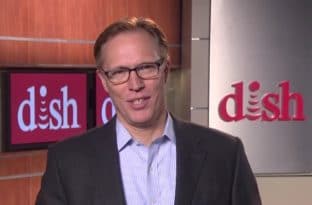When Warren Schlichting, EVP/Programming at Dish Network, wanted to share an update on the current status of the DBS provider’s negotiations with Hearst Television, he opted out of a press release.
Instead, Schlichting stated his company’s case in a video to Dish customers made available Thursday morning.
Attempting a humorous tone by noting that viewers “don’t want to see me on TV, and I don’t want to see me on TV, either.”
Updating the status of contract talks with Hearst, which saw all of the company’s channels go dark March 3 on Dish due to a retransmission fees dispute, Schlichting said, “It is truly unfortunate that your channel continues to be blacked out.”
This indicates that, as is typical with an MVPD or DBS provider, they are assigning blame on the TV station owner for pulling their stations — rather than take shared responsibility for not reaching a new accord.
What’s Schlichting’s reason for the Hearst channels going dark at this time?
“It means the system is broken,” he said. “I, and my team, have been attempting to negotiate with Hearst since before they blacked out their stations, but Hearst has refused. At this point they won’t budge from their last offer on March 1 — an offer that would double the price of their channels and make Hearst the highest paid local broadcaster on Dish.”
Schlichting compared the situation to the only local gas station in town doubling the price of a gallon of gas.
“That just doesn’t happen in most of the real world, but that’s what broadcasters are trying to do,” Schlichting asserts, adding that “it takes two willing parties to negotiate, and right now we are the only ones at the table.”
He said Hearst “won’t respond to our latest offer,” while noting that Hearst recently had a dispute with Dish rival DirecTV result in a January 2017 channel blackout on the AT&T-owned DBS provider.
Dish offered Hearst the same deal it agreed to that returned its stations to DirecTV, but they refused, Schlichting says.
“Every day we ask Hearst to come back to the negotiating table,” he notes. “We remain hopeful that they do so soon.”
In a move that many television station ownership groups have done, Schlichting is telling affected subscribers who have been blacked out to contact Hearst, and demand that they bring back their channels.
“We want to serve you, and we want Hearst to end this blackout,” Schlichting says. “I promise that our entire company will work closely to reach a fair agreement.”
Hearst had not offered a response to Schlichting as of RBR + TVBR’s deadline. However, in a statement appearing on its TV station websites made March 7, Hearst insists that it did not “black out” its stations — since they can be watched via over-the-air broadcast and on other MVPDs and on DirecTV, too.
Hearst points out that “since 2015, Dish has been involved in nearly 60% of all carriage disputes with broadcasters—by far the largest amount of any pay TV operator. In fact, Dish has refused to carry one or more broadcasters nearly every week since this past Christmas. In the end, Dish’s tactics hurt their subscribers and you—our viewers. Dish is making subscribers pay for programming they are not receiving. That just isn’t fair.”





